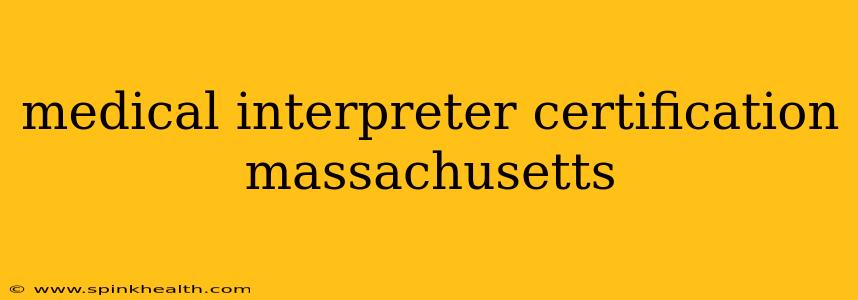The hushed tones of a doctor's office, the weight of a serious diagnosis, the urgent need for clear communication – these are the scenarios where medical interpreters play a vital role. In Massachusetts, as in many states, the demand for qualified and certified medical interpreters is steadily growing. This guide will walk you through the essential steps, addressing common questions and offering insights into securing your medical interpreter certification in the Bay State.
What are the Requirements for Medical Interpreter Certification in Massachusetts?
Massachusetts doesn't have a single, state-mandated certification for medical interpreters. Instead, certification comes from nationally recognized organizations. These organizations, such as the National Board of Certification for Medical Interpreters (NBCMI) and the Certification Commission for Healthcare Interpreters (CCHI), set their own rigorous standards and testing procedures. The path to certification generally involves meeting specific educational and experience requirements, followed by passing a comprehensive exam.
What are the key differences between NBCMI and CCHI certification?
This is a crucial question many aspiring medical interpreters grapple with. Both NBCMI and CCHI are reputable organizations, but they differ slightly in their approach and requirements. The NBCMI certification is widely recognized and often preferred by healthcare facilities. CCHI, while also highly regarded, may have a slightly different emphasis in its testing and curriculum. Researching each organization's requirements carefully will help you determine which path best aligns with your background and goals. Choosing one isn't necessarily "better" than the other; it's about selecting the certification that best suits your professional aspirations and the specific needs of your target market.
How Long Does it Take to Become a Certified Medical Interpreter in Massachusetts?
The timeline for achieving certification varies depending on your prior experience and the intensity of your study. If you already possess a strong foundation in interpreting or possess relevant linguistic skills, the process might be quicker. However, thorough preparation is vital for success on the certification exams. Expect to dedicate several months, potentially even a year or more, to dedicated study and practice.
What Kind of Training or Education is Needed?
While there's no single prescribed educational path, formal training programs specifically designed for medical interpreters are highly recommended. These programs often combine theoretical instruction in medical terminology, interpreting ethics, and healthcare systems with practical training in interpreting simulations. Some institutions offer online programs, providing flexibility for those with existing commitments. Look for programs accredited or recognized by professional organizations to ensure a high standard of education.
Where Can I Find Medical Interpreter Jobs in Massachusetts?
Once certified, the opportunities for medical interpreters in Massachusetts are plentiful. Hospitals, clinics, court systems, social service agencies, and private practices all employ interpreters. Online job boards, professional networks, and direct outreach to healthcare facilities are excellent avenues for finding employment. Networking within the interpreting community is also incredibly valuable.
Are there specific language requirements for Medical Interpreter Certification?
This largely depends on the certifying organization and the specific demand in the market. High demand exists for Spanish interpreters in Massachusetts, but proficiency in other languages, like Portuguese, Haitian Creole, Vietnamese, or Mandarin, is also valuable. The certification exams will rigorously test your proficiency in both the source and target languages. Be prepared to demonstrate mastery in medical terminology, nuances of communication, and cultural sensitivity.
Conclusion: Embarking on a Rewarding Career Path
Becoming a certified medical interpreter in Massachusetts requires dedication, commitment, and a genuine passion for bridging communication gaps. However, the rewards are significant – a chance to make a real difference in people's lives, coupled with a growing demand for skilled professionals. By carefully planning your preparation and choosing a reputable certification path, you can embark on a rewarding career that combines linguistic skills with the critical role of ensuring effective healthcare communication.

